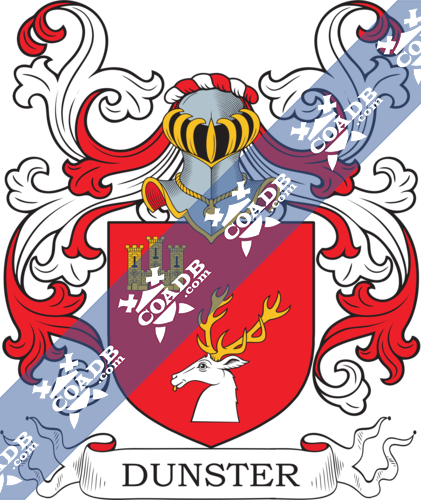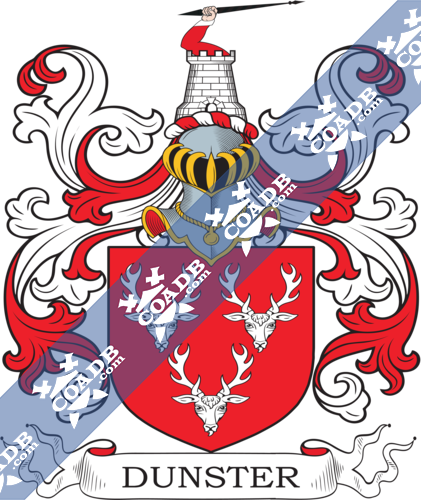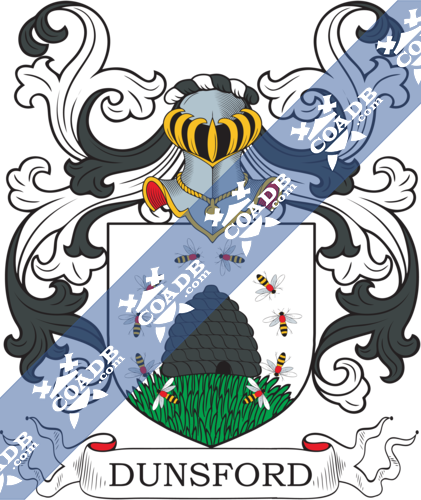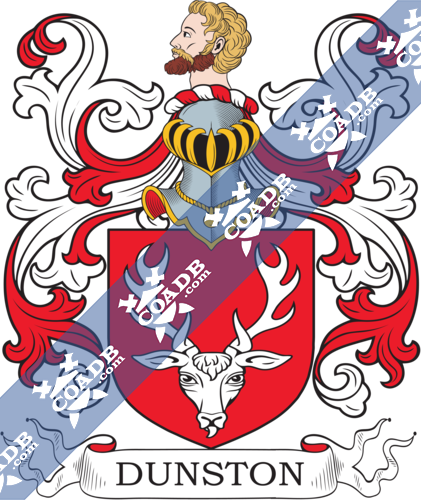Dunster Family Crest, Coat of Arms and Name History

Dunster Coat of Arms Gallery
Don’t know which Coat of Arms is yours?
We can do a genealogical research. Find out the exact history of your family!
Learn MoreDunster Origin:
England
Origins of Dunster:
This particular name is of Anglo-Saxon origin and is a geographical surname acquiring from the place called ‘Dunster’ in Somersetshire. The place was noted in the Domesday Book of 1086 as simply ‘Torre’, from the Old English pre 7th Century ‘torr’, which means high rock, rocky peak, slope, and was first noted in its new form in 1138, as ‘Dunestore’, with the addition of the Old English specific name ‘Dunn(a)’, originally a byname meaning ‘the dark one’, from ‘dunn’, which means dark-colored, and renamed from some early owner of the land. The term ‘tor,’ appeared mainly in the West Country, is Celtic in origin, from the Cornish ‘tor,’ which means influence, mountain, and also appeared as ‘tor’ in Welsh and ‘torr’ in Gaelic. One William Dunster named at Uffculme, Devon, in July 1631, and the wedding of Thomas Dunster and Joan Chicke noted at St. Nicholas, Combe, Somersetshire, in February 1654.
Variations:
More common variations are: Dunsatter, Dunsedter, Tunster, Dunstar, Danster, Donster, Dnister, Denster, Dinster, Dunstor.
England:
The surname Dunster first appeared in Somerset at Dunster, home of Dunster Castle, an old motte and bailey castle, now a country house owned by the National Trust, which serves it as a tourist attraction. The location has fortified since the late Anglo-Saxon time and the by the 11th century, William de Mohun had created a timber palace on the site. After the siege of Dunster Castle at the end of the English Civil War, much of the land damaged but was later changed to fit Victorian tastes. One of the first records of the name was William de Mohun of Dunster (c.1090-c.1155) who was a favorite of Empress Matilda, daughter of King Henry I, and a loyal follower of her in the war against King Stephen. He got the epithet the “Scourge of the West, ” and after the war, Empress Matilda gave him the title Earl of Somerset, in 1141. His father, William was Sheriff of Somerset in the year 1084.
The very first recording spelling of the family was shown to be that of Richard de Dunsterre, dated about the year 1327, in the “Exchequer Lay Subsidy Rolls,” It was during the time of King Edward 111, who was known to be the “The Father of the Navy,” dated 1327-1377. The origin of surnames during this period became a necessity with the introduction of personal taxation. It came to be known as Poll Tax in England.
Ireland:
Many of the people with surname Dunster had moved to Ireland during the 17th century.
United States of America:
Individuals with the surname Dunster landed in the United States in three different centuries respectively in the 17th, 18th, and 19th. Some of the people with the name Dunster who arrived in the United States in the 17th century included Henry Dunster, who landed in Boston, Massachusetts in 1640. Henry Dunster settled in Cambridge Massachusetts in 1648. Tobias Dunster, who arrived in Virginia in 1663.
People with the surname Dunster who landed in the United States in the 18th century included Eliza Dunster, who landed in Boston, Massachusetts in 1744. William Dunster settled with his wife Elizabeth in Baltimore in the year 1775.
The following century saw more Dunster surnames arrive. Some of the people with the surname Dunster who arrived in the United States in the 19th century included John and Mrs. Dunster settled in New York in 1820 with a child.
Here is the population distribution of the last name Dunster: England 920; United States 519; South Africa 384; Australia 310; Canada 231; Scotland 85; New Zealand 66; Wales 56; Spain 12; Switzerland 2.
Notable People:
Henry Dunster (November 1609 (baptized) – February 1658/1659) was an Anglo-American Puritan priest and the first president of Harvard College. Brackney says Dunster was “an important precursor” of the Baptist denomination in America, especially about infant baptism, soul freedom, religious liberty, congregational governance, and radical Biblicism.
Blazons & Genealogy Notes
1) (Scaringion, co. Somerset; granted 17 June, 1664). Gu. a buck’s head in base ar. attired or, in the dexter chief a castle of the third.
2) Gu. three stags’ heads cabossed ar. Crest—Out of the top of a tower ar. an arm embowed, vested gu. cuffed of the first, holding a tilting spear sa.








